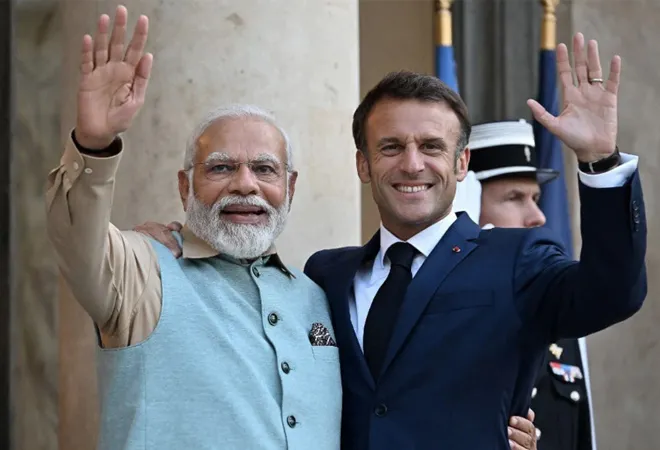This is a moment of transformational change in the global order, with growing uncertainty about the future. To navigate this uncertain environment, new partnerships and new platforms are taking shape as nations struggle to make sense of the world around them. At a time like this, India has become the centre of attraction of the world. Today, all major powers of the world want to have a robust partnership with India. Indian diplomatic activity and Prime Minister Narendra Modi's busy calendar stand testimony to New Delhi's growing centrality in the emerging international milieu. Against this backdrop, after his successful state visit to America, Prime Minister Modi was in France this week as the chief guest on the occasion of the French national day - Bastille Day.
This visit was a celebration of 25 years of their bilateral strategic partnership, as Modi was conferred the Grand Cross of the Legion of Honour by Macron. A 269-member Indian tri-services contingent participated in the Bastille Day parade, marching to the tune of 'Saare jahan se achcha' and three Rafale fighter jets of the Indian Air Force (IAF) joined the flypast along with French jets.
Indian diplomatic activity and Prime Minister Narendra Modi's busy calendar stand testimony to New Delhi's growing centrality in the emerging international milieu.
Relations between India and France have stood the test of time, with France supporting India's stand on internationally disputed and divisive topics ranging from Kashmir to nuclear power. France was the first country with veto power to support India's permanent membership in the United Nations Security Council. The strategic partnership between the two countries gained momentum in the last decade of the last century. After the nuclear tests, when the wider West imposed sanctions on India, France did not join that bandwagon. The best thing about Indo-French relations is that both countries have shown a willingness to adapt this friendship to the 21st century. The similar approach of Prime Minister Modi and President Macron on many global issues confirms this. Both leaders attach great importance to strategic autonomy in any partnership. Despite being a member of NATO, France showed the same practical attitude towards Russia as India did. France's often immediate support for important initiatives of India also shows the strength of the bilateral partnership. Prime Minister Modi's personal bond with Macron remains an important factor in deepening relations with France at a time of great geopolitical turbulence.
France has emerged as a key defence partner of India, and this partnership gained a new dimension during the visit of the Prime Minister. In fact, the Russia-Ukraine war has forced India to reconsider its excessive strategic dependence on one nation. Therefore, India is focusing on expanding defence partnerships with key countries as well as becoming self-sufficient in defence production. In this, countries like France become vital; they are not only ready to provide state-of-the-art defence equipment, but also encourage co-production and co-development by sharing their technology. An MoU between Mazgon Dockyard Ltd and Naval Group for the construction of three additional submarines under the P75 programme as well as a roadmap for cooperation in advanced aeronautical technologies by supporting the joint development of a combat aircraft engine between Safran and DRDO (Defence Research and Development Organisation) has the potential to redefine the Indo-French defence partnership. India will be setting up a Technical Office of the DRDO at its Embassy in Paris to further accelerate the process of high-tech defence collaborations.
India is focusing on expanding defence partnerships with key countries as well as becoming self-sufficient in defence production.
The Indo-Pacific region is a geography of common concern to India and France, so the launch of a roadmap of India-France Cooperation in the Indo-Pacific is likely to make this engagement more operational. Given the interests of both countries in this geography, they are also joining hands with other like-minded nations in carving new platforms. Where France is strengthening a front together with Australia and India, the trio of France, the United Arab Emirates and India are coming together considering their interests in the Arabian Sea. PM Modi's visit to the UAE while returning from France also has deep implications.
Modi announced the launch of India's Unified Payment Interface (UPI) in France, as well as a five-year validity short-stay Schengen Visa for Indians who are degree holders from French educational institutions (Masters and above). The mobility of skilled professionals is now emerging as a key aspect of India's engagement with the wider West. France's decision to expand the scope of visas for Indian students comes at a time when European nations are vying with countries like Australia and Canada to attract numerous students going abroad to study. From blue economy and ocean governance to renewable energy, Artificial Intelligence, semiconductors and digital technology, the ambit of issues is widening for India and France to work together.
Prime Minister Modi met French business leaders and invited them to be a part of India's growth story. The dynamism of the Indian economy is now luring global corporate giants to India. In recent times, India has moved forward with Free Trade Agreements (FTAs) with various nations. The European Union is also keen to finally gain some traction on its long-pending FTA with India. The French leadership will be crucial in this regard.
As India and France celebrate 25 years of their strategic partnership, Modi's visit has prepared the framework of this relationship for the next 25 years. The political comfort between the two nations is opening up new avenues of cooperation for New Delhi and Paris, which the political leadership seems more than willing to embrace.
This commentary originally appeared in NDTV.
The views expressed above belong to the author(s). ORF research and analyses now available on Telegram! Click here to access our curated content — blogs, longforms and interviews.




 PREV
PREV


